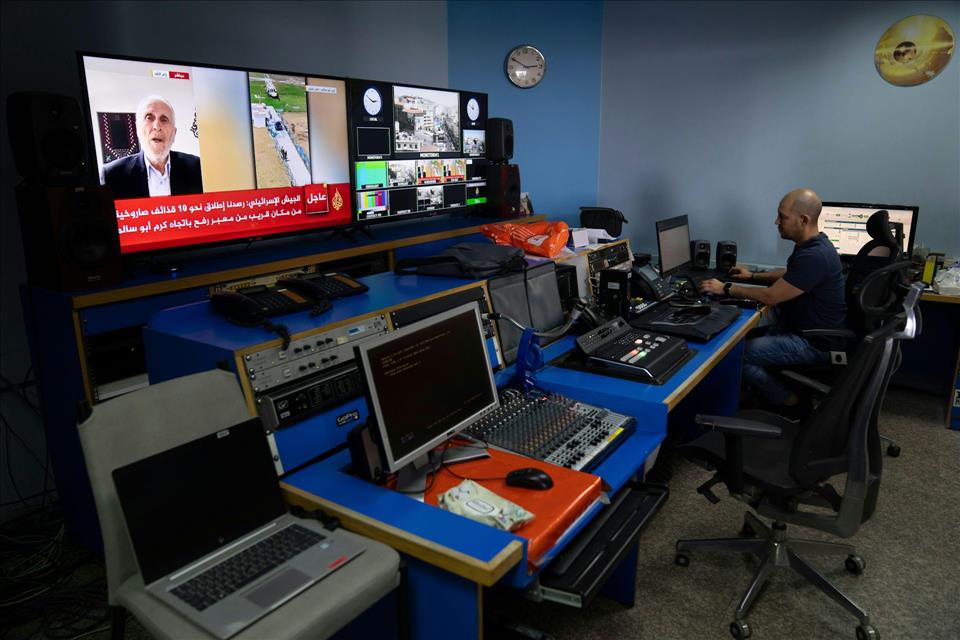
Palestinian Authority Joins Israel In Attacking Al Jazeera Raising Concerns About Press Freedom
Al Jazeera has roundly condemned the closure and accused the PA of attempting“to dissuade the channel from covering the rapidly escalating events taking place in the occupied territories”.
The network said its journalists were specifically told not to report from areas around Jenin, Tubas and Qalqilya , where much of the recent violence has been concentrated.
The Palestinian news agency Wafa reported that this was due to the network broadcasting“inciteful content, spreading misinformation, and interfering in Palestinian internal affairs”.
This sentiment was strangely reminiscent of the Israeli government when last September it raided the same office of Al Jazeera in Ramallah and suspended its operations there for 45 days. At the time, Israel's prime minister, Benjamin Netanyahu , issued a statement accusing Al Jazeera of“inciting against the soldiers of the IDF (Israel Defense Forces)”. The Israeli government had previously banned the company's broadcasts inside Israel and closed its office in East Jerusalem.
But is“incitement” just another name for“reporting”? The BBC has often made the argument that it is equally attacked by all sides in its war coverage. The implication is that this must mean it is in the right place.
So has Al Jazeera been singled out because it covers events governments and authorities would rather stay covered up? Or is it simply the only network which has (or had) the resources to cover the region fairly comprehensively via local staff who continue to live in Gaza and in the West Bank? Accredited international media can currently report from the West Bank, but have no access to Gaza.
According to Agence France-Press, quoted here by RTÉ, :“Tensions between the Doha-based network and the Fatah movement of Palestinian President Mahmoud Abbas, have risen in recent weeks following the channel's coverage of clashes between security forces and militants in Jenin” during which 11 people have been killed.
It is expected that in the internal power vacuum following the Gaza war, there will be a further contest for control of the Palestinian administration between those loyal to the PA and Fatah and those supporting Hamas or Islamic Jihad.
The PA says the current ban on Al Jazeera will last until it“resolves its legal status, which was deemed in violation of applicable laws and regulations in Palestine”, according to Wafa reports. To date the PA has given no examples of how the network has breached local regulations or how it can resolve its status.
Media freedom issuesInternational non-governmental organisations have lined up to criticise the decision. In an interview with Al Jazeera, the chief executive of the Committee to Protect Journalists (CPJ), Jodie Ginsberg, labelled the decision“really disturbing” and called for it to be reversed immediately. She said the decision came as“no surprise” as the PA“had already condemned Al Jazeera for its coverage of the raids in Jenin”.
She added the PA“were no strangers to this kind of censorship. We've seen them in the past ban and shut down news websites and arrest journalists. Security forces have assaulted journalists. In this moment it is really vital that we have reporters able to report freely and they have not been able to do that in this war, and in particular in Gaza.”
The move has also been criticised by some outspoken Palestinian commentators, including Mustafa Barghouti , general secretary of the reformist group, the Palestinian National Initiative. Speaking on Al Jazeera, Barghouti called the move a mistake, saying it was a matter of freedom of the media, and a“self-hurting act”. He added that:“This decision should be reversed as soon as possible.”
Al Jazeera covers the decision of the PA to close its operation down.
A central plank of Al Jazeera's mission and its founding tagline is “The Opinion and the Other Opinion” . The network has also emphasised its role of being“the voice of the voiceless” and it has championed the stories of the global south. Since the outbreak of the war, it has attempted to provide constant coverage, both of Gaza but also of the West Bank.
The network has paid a heavy price for this coverage. Eight out of 146 journalists killed covering the conflict in Israel, Gaza and Lebanon were working for Al Jazeera, according to CPJ data.
Since its launch in 1996, the network has been banned or had its reporters jailed at various times and in numerous countries. For example in 2013 a court in Cairo ordered its local affiliate, Al Jazeera Mubasher Misr , to stop broadcasting in Egypt after the government claimed the network was a national threat and was biased towards the Muslim Brotherhood. That same year similar charges were levelled erroneously against three international Al Jazeera journalists, including Australian Peter Greste , who were put on trial and sent to jail.
Al Jazeera continues to provide a different take on Middle Eastern coverage, putting more emphasis on Arab points of view than other international networks. It will continue reporting news on the West Bank via its headquarters in Doha in Qatar. But it will now be reporting from a distance. Journalism will be the poorer for having fewer people on the ground, who are able to verify what is going on locally and in person.

Legal Disclaimer:
MENAFN provides the
information “as is” without warranty of any kind. We do not accept
any responsibility or liability for the accuracy, content, images,
videos, licenses, completeness, legality, or reliability of the information
contained in this article. If you have any complaints or copyright
issues related to this article, kindly contact the provider above.


















Comments
No comment